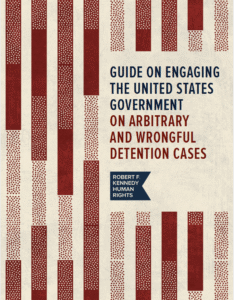Robert F. Kennedy Human Rights and Bangladeshi human rights organization Odhikar renew calls for the urgent protection of the rights of the Rohingya people on the third anniversary of the genocide against them in Myanmar.
On August 25, 2017, the Myanmar military began a campaign of “clearance operations” against the minority Rohingya community in Rakhine state and perpetrated widespread and serious international crimes, including killing thousands, raping women and girls, committing torture, torching entire communities, and forcing more than 740,000 people to flee, mostly to Bangladesh. Since then, numerous cases have been pursued to hold the senior leaders of Myanmar accountable: an investigation at the International Criminal Court is underway; the International Court of Justice (ICJ) has ordered provisional measures as it considers whether Myanmar violated its obligations under the Convention on the Prevention and Punishment of the Crime of Genocide; and a federal criminal court in Argentina is pursuing a case against State Counsellor Aung San Suu Kyi and other senior leaders of the military.
Despite these efforts, the Government of Myanmar continues to deny the occurrence of those serious human rights abuses and has not taken necessary measures to protect the Rohingya from the risk of future genocidal attacks. Further, it continues to deny their basic rights. Thousands of Rohingya remaining in Myanmar are being held in internment camps and urban ghettos that a U.N. investigator recently likened to those seen in Nazi-occupied Europe. The Government continues to deny the Rohingya their fundamental rights, such as the right to citizenship, the right to freedom of movement to go to school or to the hospital, and even the right to marry. It has generally failed to comply with the provisional measures ordered by the ICJ, to protect the lives of the remaining Rohingya in Myanmar, and to meaningfully investigate and try any of the senior commanders responsible for the mass atrocities committed in 2017. The Rohingya cannot yet live freely, safely, and fully in their home country, and the ongoing violations of their fundamental rights underscore the persecutory and genocidal intent of the Myanmar Government.
We call on all countries, including the United States Government, to formally recognize that the August 2017 attacks against the Rohingya constituted a genocide and to demand accountability for the perpetrators. We urge all countries to support efforts to bring them to justice and to ensure that Myanmar and Bangladesh meet the conditions necessary for the safe, dignified, and voluntary return of Rohingya refugees to their homes.
Finally, until the Rohingya are able to return to Myanmar, we urge the Bangladesh Government to amend policies that infringe on the rights and well-being of the refugees. In particular, we renew our calls to restore full access for groups providing vital humanitarian services to the camps particularly during the COVID-19 crisis and to remove the barbed-wire fencing that has confined hundreds of thousands of refugees against their will. Such measures cause further unnecessary suffering and isolation for people who are struggling to recover from the horrors they endured three years ago.
Additional information on the Rohingya genocide from Robert F. Kennedy Human Rights’ 2018 delegation to visit Myanmar and meet with refugees in Cox’s Bazar, Bangladesh is available here.
For more information on Odhikar, please visit www.odhikar.org.




